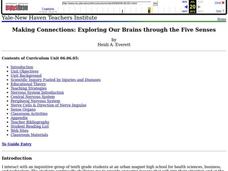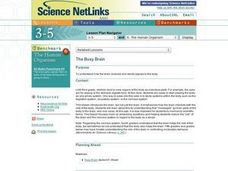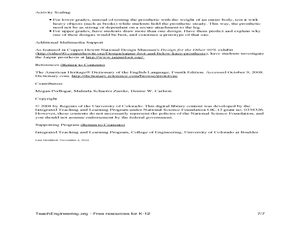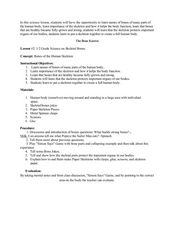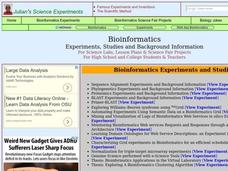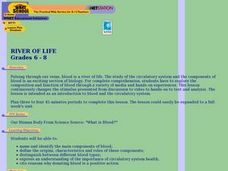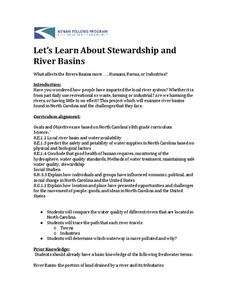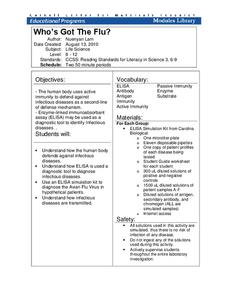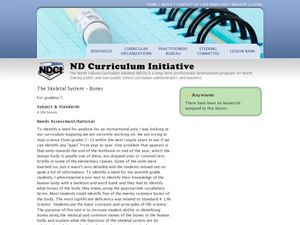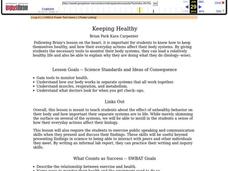Curated OER
Making Connections: Exploring Our Brains through the Five Senses
Students identify structures of the brain, and neurons and analyze their functions. In this nervous system lesson students create drawings and models of anatomy.
Curated OER
A Child's Journey Through Medicine
Fifth graders identify the symptoms of asthma. In this biology lesson, 5th graders draw and label models of heart and lungs. They conduct a survey on asthma and construct graphs based on result.
Curated OER
The Busy Brain
Students explore biology by completing a human body worksheet. In this human brain lesson, students identify the different anatomy within the brain and the functions those pieces form. Students read an article about signals in the brain...
Curated OER
Prosthetic Party
Students examine human anatomy by creating a prosthetic limb. In this medical engineering instructional activity, students view numerous images of prosthetics used in science today and define several medical terms associated with...
Curated OER
The Mind-Body Connection
Second graders learn about the human body. In this biology lesson plan, 2nd graders will begin with the basics of understanding charts and graphs and progress into units that cover the body systems, and mental and emotional health....
Curated OER
Sizing Up the Supersize Croc
Students examine and compare traits of humans and crocodiles. In this crocodile lesson plan students use a ratio to estimate the height of a person and compare that to a crocodile.
Curated OER
The Bone Known
Students explore the human skeleton. In this biology instructional activity, students view a diagram of the human skeleton and identify the names of bones. Students define the role bones play in protecting the human body and construct a...
Curated OER
Bioinformatics
Students conduct a series of scientific investigation using bioinformatics. In this molecular biology lesson, students collect experimental data using different educational softwares. They calculate and analyze relationships using...
Curated OER
River of Life
Students explore the composition and function of blood through a variety of media and hands-on experiences. This lesson is a very good introduction to blood and the circulatory system.
Curated OER
Introduction to the Digestive System
Students describe the digestive system and simulate what happens to food as it passes through. They use an apple, tubing and hydrochloric acid to simulate the digestive process.
Nuffield Foundation
Assessing Human Hearing
Young scientists explore hearing through multiple experiments, demonstrations, and activities. They focus on the changes in hearing over a lifetime, how we can determine where a sound is coming from, and the ability to filter noises.
Kenan Fellows
Let's Learn About Stewardship and River Basins
What does it mean to be a good steward? Middle school environmentalists learn to care for their state's waterways through research, a guest speaker, and poster activity. Groups must locate and learn more about a river basin and the human...
Cornell University
Who’s Got The Flu?
Become an immunologist for the day. Scholars elicit the use of the enzyme-linked immunoabsorbent assay (ELISA) to diagnose an infectious disease. Through the process, they learn about the immune system response to infectious diseases.
LABScI
Circulation and Respiration: Vital Signs
What do your vital signs tell your doctor? An engaging hands-on lesson has your learners monitor their own lung capacity, blood pressure, and heart rate. They then connect the vital measures to the workings of the circulatory and...
Nuffield Foundation
Monitoring the Body's Reaction to Stress
When stressed, do you prefer the fight or flight response? Scholars observe, measure, and identify the body's response to stress using a well-researched methodology. They learn about the autonomic nervous system, hormones, and more.
Curated OER
Regents High School Examination: Living Environment 2009
Emerging ecologists need a full understanding of life, from the inner workings of a cell to the complex relationships among organisms. This examination is meant to assess high schoolers after an entire year course on the living...
Curated OER
Regents High School Examination: Living Environment 2007
Environmental science enthusiasts show what they know at the end of the year by taking this full-fledged final exam. They answer multiple choice, graph interpretation, and essay analysys questions, 73 of them in all. Topics range from...
Curated OER
The Skeletal System - Bones
Seventh graders identify the common bones in the human body. In this biology instructional activity, 7th graders research two bones assigned to them. They explain why bones are important to us.
Curated OER
The Skeletal System
Students identify the different parts of the skeletal system. In this biology activity, students put together a skeleton using an interactive website. They evaluate the accuracy of their own answers.
Curated OER
Signal Transmission in the Nervous System
Young scholars explore signal transmission in the nervous system. They determine the speed of nervous transmission in an integrated nervous system and investigate the differences between signal transmission in a single neuron and in a...
Curated OER
The Skeletal System
Students identify bones off a skeleton during quizzes; assemble disarticulated skeletons; bird, frog and rat. They dissect frogs, remove the muscle tissue, and identify of bones.
Curated OER
Biological Sciences
Young scholars examine biodiversity and interrelatedness concepts. In this ecology lesson students go on a field trip and fill out a data sheet.
Curated OER
Keeping Healthy
Learners describe the relationship between exercise and health. They name ways to monitor their health and the equipment used to do so. Students name solutions to common health issues and explain why good nutrition and exercise are...
Michigan State University
Bug Lyphe!
Introduce ecology classes to biodiversity and interdependence in ecosystems with a PowerPoint presentation. Then, they get up-close and personal with the invertebrate world by collecting insects, classifying them, and graphing their...
